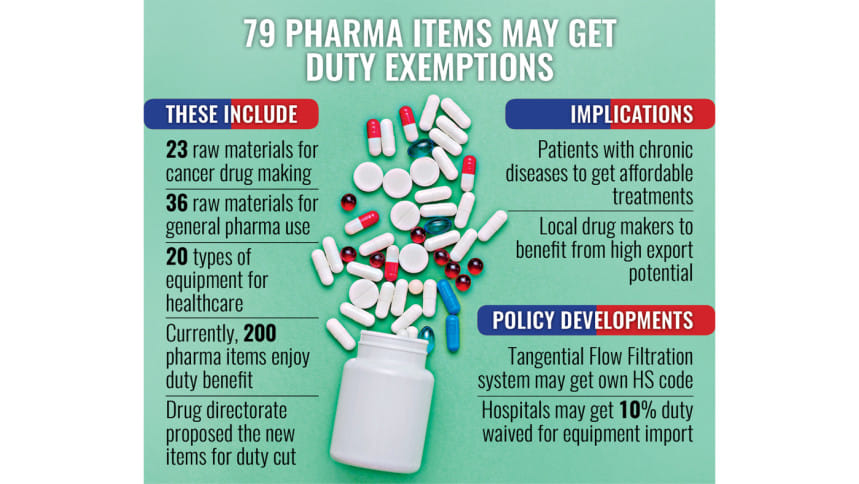Cancer drugs, insulin to get cheaper as NBR plans tax cuts

The government is going to expand import duty exemptions on pharmaceutical raw materials and medical equipment, with 79 new items expected to be added to the duty-free list in the upcoming national budget.
The move aims to ease pressure on drug manufacturers and make treatments for cancer, kidney, and vascular diseases more affordable for patients.
In the budget for the fiscal year (FY) 2025-26, the government plans to waive import duties on 23 new raw materials used in cancer drug production, 36 for chronic illnesses such as diabetes, and 20 types of medical equipment, according to finance ministry officials.
Currently, at least 200 pharmaceutical products enjoy similar exemptions.
As part of its broader push to improve healthcare access, the government also plans to waive the existing 10 percent customs duty on medical equipment imports by hospitals.
It is also likely to introduce a 1 percent duty on imports of the Tangential Flow Filtration (TFF) system, a vital technology in vaccine production, under a new import category. Currently, TFF imports fall under import categories with higher duties.
In addition, customs duty on imports listed under HS Code 3917.39.90, commonly used by pharmaceutical manufacturers, may be reduced to 15 percent from 25 percent.
The local pharma industry is also pressing for a separate HS code for the sterile connector, a component in insulin manufacturing that currently faces a 25 percent duty under this category.
Drug makers said that the existing classification raises production costs and limits affordability.
"The government's decision to continue duty exemptions on essential pharmaceutical raw materials in the FY 2025-26 budget is a welcome move," said Arefin Ahmed, executive director at Incepta Pharmaceuticals.
"It will benefit both drug manufacturers and patients," he added.
"This measure will not only make critical medicines, such as oncology drugs and certain general medicines, more affordable for patients, but also help expand the domestic pharmaceutical market," said Ahmed.
He added that maintaining international quality standards involves significant investment in infrastructure and compliance.
"We hope the government continues to strike a balance between affordability for patients and sustainability for local manufacturers," Ahmed commented.
The government, he said, also has a responsibility to ensure that the price of essential medicines remains within reach for the average patient.
According to finance ministry sources, the Directorate General of Drug Administration (DGDA) recommended the inclusion of 23 new raw materials used in cancer treatment.
These include Fostamatinib, Deucravacitinib, Peficitinib hydrobromide, Rilzabrutinib, Levoleucovorin, Povorcitinib, Ivarmacitinib, Momelotinib, Ganciclovir, Tezepelumab, and Faricimab, among others.
These ingredients are critical in the production of modern cancer drugs, and easing their import is expected to enhance the quality and availability of cancer care across the country.
Muhammad Zahangir Alam, chief financial officer of Square Pharmaceuticals Ltd, said the latest proposal reflects a growing recognition of the pharmaceutical industry's importance in both public health and economic development.
"The inclusion is a sign that the government is aware of the sector's strategic importance, not just as a health safeguard but also as a driver of export growth," he told The Daily Star.
Alam added that some life-saving drugs, including cancer and respiratory medicines, still face high input duties, which affect affordability.
"Such a move would not only ease the cost burden on manufacturers but also make vital medicines more accessible to the public," he said.
Monjurul Alam, CEO of Beacon Medicare Limited, called the initiative a vital step forward in improving cancer care and easing the burden on patients.
"Cancer treatment is both long-term and extremely expensive. The government should pay closer attention to biologic raw materials, which are now at the core of cancer therapies," he said.
"Present treatments rely heavily on biological drugs, including monoclonal antibodies and immunotherapies," he added. "These are cutting-edge but costly medicines. If the government extends tax exemptions to these drugs, it will greatly help patients access the latest treatments."
Muhammad Halimuzzaman, treasurer of the Bangladesh Association of Pharmaceutical Industries, also welcomed the government's decision to include cancer drugs, general medicines, and chronic care treatments in the updated essential drug list.
"These additions will significantly reduce treatment costs as many of these drugs are now exempt from high taxes," he said.
"Patients with long-term conditions like cancer, kidney, and vascular diseases, who require regular medication, will benefit the most," said Halimuzzaman.
"As new molecules enter the list, accessibility expands, benefiting both patients and companies," he added, describing the initiative as a clear step in the public interest.

 For all latest news, follow The Daily Star's Google News channel.
For all latest news, follow The Daily Star's Google News channel. 










Comments